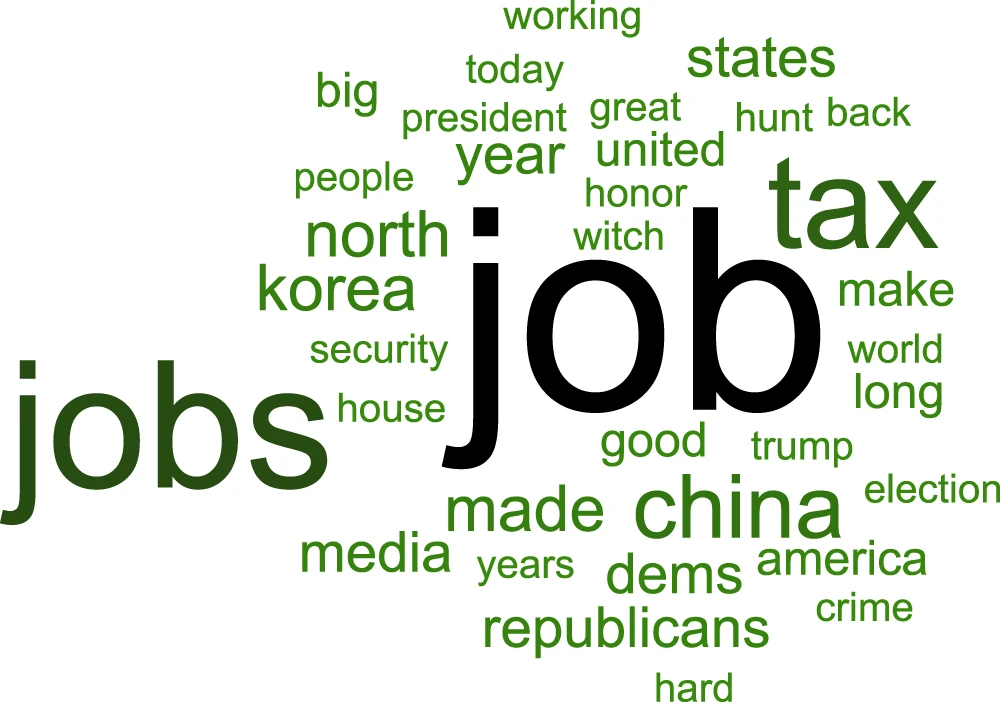
The pair structure is ignored in this representation. Size of each word corresponds to its frequency, as does font color. The darker the font, the greater the frequency.
President Donald Trump’s controversial use of social media is widely known and theories abound about its ulterior motives. New research published today in Nature Communications claims to provide the first evidence-based analysis demonstrating the U.S. President’s Twitter account has been routinely deployed to divert attention away from a topic potentially harmful to his reputation, in turn suppressing negative related media coverage.
The international study, led by the University of Bristol in the UK, tested two hypotheses: whether an increase in harmful media coverage was followed by increased diversionary Twitter activity, and if such diversion successfully reduced subsequent media coverage of the harmful topic.
Lead author Professor Stephan Lewandowsky, Professor of Cognitive Psychology at the University of Bristol, said: “Our analysis presents empirical evidence consistent with the theory that whenever the media report something threatening or politically uncomfortable for President Trump, his account increasingly tweets about unrelated topics representing his political strengths. This systematic diversion of attention away from a topic potentially damaging to him was shown to significantly reduce negative media coverage the next day.”
Social media gives political leaders direct and immediate access to their constituents, offering an opportunity to explain their actions and policy proposals at an unprecedented scale. President Trump is one of the most prolific users among world leaders. Since the beginning of his candidacy in 2015, approximately 30,000 tweets have been sent from Trump’s account. While anecdotal reports suggest the tweets have served to divert media attention away from news that can be assumed to be politically harmful to him, evidence for such diversion has remained unsubstantiated – until now.
The study focused on Trump’s first two years in office, scrutinising the Robert Mueller investigation into potential collusion with Russia in the 2016 Presidential Election, as this was politically harmful to the President. The team analysed content relating to Russia and the Mueller investigation in two of the country’s most politically neutral media outlets, New York Times (NYT) and ABC World News Tonight (ABC). The team also selected a set of keywords judged to play to Trump’s preferred topics at the time, which were hypothesized to be likely to appear in diversionary tweets. The keywords related to “jobs”, “China”, and “immigration”; topics representing the president’s supposed political strengths.

The researchers hypothesized that the more ABC and NYT reported on the Mueller investigation, the more Trump’s tweets would mention jobs, China, and immigration, which in turn would result in less coverage of the Mueller investigation by ABC and NYT.
In support of their hypotheses, the team found that every five additional ABC headlines relating to the Mueller investigation was associated with one more mention of a keyword in Trump’s tweets. In turn, two additional mentions of one of the keywords in a Trump tweet was associated with roughly one less mention of the Mueller investigation in the following day’s NYT.
Such a pattern did not emerge with placebo topics that presented no threat to the President, for instance Brexit or other non-political issues such as football or gardening.
The research also conducted an expanded analysis considering the President’s entire Twitter vocabulary as a potential source of diversion, which confirmed the generality of the researchers’ conclusions. Specifically, the analysis identified nearly 90 pairs of words that were more likely to appear in tweets when Russia-Mueller coverage increased, and that suppressed media coverage the next day. Those word pairs largely represented the President’s political strengths, focusing again in particular on the economy.
Both analyses accounted for a number of potentially confounding factors and robustness checks, such as randomisation, sensitivity analyses, and the use of placebo keywords, to rule out artifactual explanations and strengthen claims of possible causal relationships.
Professor Lewandowsky said: “It’s unclear whether President Trump, or whoever is at the helm of his Twitter account, engages in such tactics intentionally or if it’s mere intuition. Either way, we hope these results serve as a helpful reminder to the media that they have the power to set the news agenda, focusing on the topics they deem most important, while perhaps not paying so much attention to the Twitter-sphere.”


